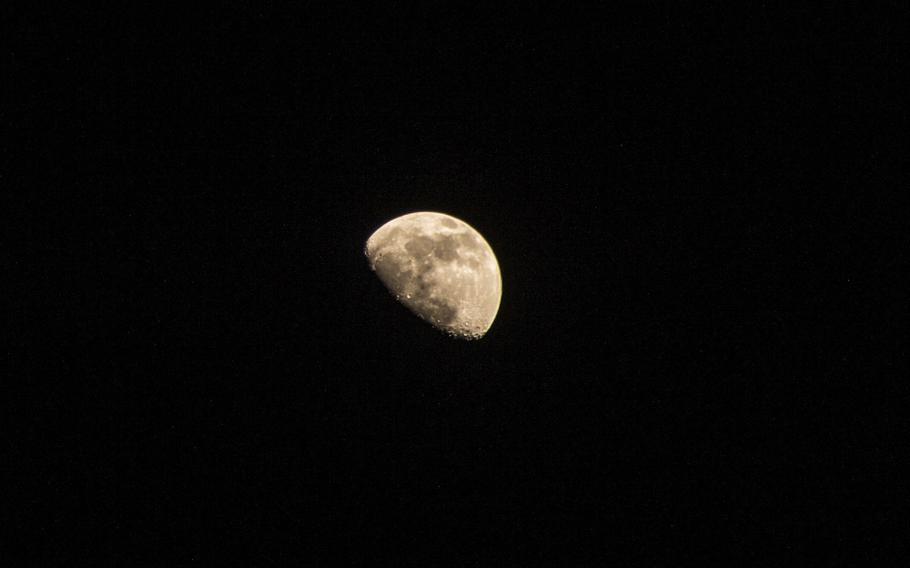
The moon seen from aboard the Wasp-class amphibious assault ship USS Iwo Jima Feb. 4, 2020. (Dominick A. Cremeans/U.S. Navy)
Jeff Bezos' attempt to overturn one of the most significant NASA contracts in years failed Friday, dealing his space company another setback in its quest to land astronauts on the moon.
Bezos' Blue Origin and Dynetics, a defense contractor that also lost out on the contract, had argued in protests filed with the Government Accountability Office that NASA had erred when it awarded Elon Musk's SpaceX a $2.9 billion contract to use its next-generation Starship spacecraft to ferry astronauts to and from the lunar surface. (Bezos owns The Washington Post.)
NASA had said it ran a thorough competition for what's known as the Human Landing System, and that SpaceX not only had the best technical solution, its bid was by far the lowest. In its ruling, the GAO rejected Blue Origin's arguments that the space agency had overlooked the company's attributes, writing in a news release that it concluded "that NASA did not violate procurement law or regulation when it decided to make only one award."
It said NASA's "evaluation of all three proposals was reasonable, and consistent with applicable procurement law, regulation and the announcement's terms."
At the time of the award, NASA officials said that they had initially intended to award two contracts to foster competition as well as have a backup in case one of the contractors faltered. It was only able to award one contract, however, because it simply didn't have the funding from Congress, and it was only able to do that after SpaceX updated its payment schedule to fit within NASA's budget.
Even though Blue Origin's bid was $6 billion, or twice that of SpaceX, Bezos has since tried to remedy the budget shortfall, as part of a broad effort to force NASA to select a second company. In an open letter to NASA Administrator Bill Nelson this week, he wrote that if NASA awarded the company a lunar lander contract, Blue Origin would continue to fund the development of a test flight of its spacecraft to low Earth orbit and waive up to $2 billion in payments over the next two years.
In the letter, he continued to criticize NASA's selection process and argued that having two providers was vital: "Without competition, NASA's short-term and long-term lunar ambitions will be delayed, will ultimately cost more, and won't serve the national interest." And he touted the capabilities of the team Blue Origin had assembled, which includes Lockheed Martin, Northrop Grumman and Draper.
NASA has said that after the first human landing on the moon, which would be the first since the last Apollo mission in 1972, it would hold additional competitions for future moon landings as part of its Artemis program. But Bezos said that program "won't create true competition because it is rushed, it is unfunded, and it provides a multiyear head-start to the one funded, single-source supplier."
Landing astronauts on the moon is a personal passion for Bezos, who has said watching Neil Armstrong and Buzz Aldrin step onto the moon in 1969 ignited a lifelong interest in space. He picked the anniversary of that Apollo 11 mission, July 20, to fly on his company's New Shepard spacecraft on a suborbital trip to space and back. And now that he has stepped down as CEO of Amazon, he has said he would devote more time and energy to Blue Origin, which has lagged far behind SpaceX.
But just hours after touching down in a successful flight, he created controversy by thanking "every Amazon employee and every Amazon customer because you guys paid for all of this."
That was widely regarded as a tone-deaf statement that elicited ire from detractors, including U.S. Rep. Nydia Velázquez, D-N.Y., who on Twitter linked to an article about how much Amazon employees are paid and wrote, "While Jeff Bezos is all over the news for paying to go to space, let's not forget the reality he has created here on Earth."
Nelson, the NASA administrator, has said he has not been able to comment on the status of the Artemis program while the protest was being decided by the GAO. Under the Trump administration, the goal was to land astronauts on the lunar surface by 2024. Nelson has also embraced that timeline. The space agency, however, has been conducting an internal review about what is feasible given the amount of funding it has from Congress.